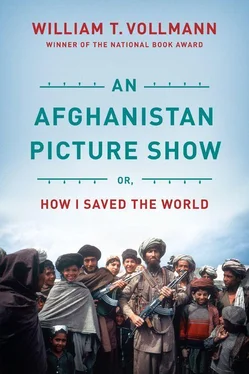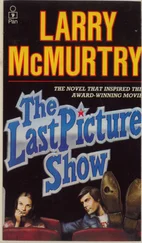“Which Soviet tactics cause you the greatest problems?”
“There are four stages,” Poor Man said. — He was sitting out with the General and the Young Man at the General’s house in Peshawar, and a bird was hopping in the lime tree. — “First they come with gun-ship helicopters, and they know our locations; they bombard us. After that, the gunships having marked the place for them, come the MiG bombers. Third comes heavy artillery fire — mortars and rockets. And then the fourth is the Soviet infantry. We have to fight directly with them in this fourth stage, because the infantry comes up against us head-on. All of this is difficult.”
“What arms and other aid would you most appreciate?”
“The first thing we want is anti-gunship weapons, to shoot down the helicopters, because they are the most damaging thing. And secondly, we want weapons that we can give to the people, so that we can raise troops.”
“Are the Afghans getting tired of fighting now? Do they fight less strongly?”
“We have a high morale,” Poor Man smiled. “We like to fight, and we will keep on fighting.”
The red hill [5]
They walked for thirty-six hours. What the Young Man hated the most were the river crossings in the dark, when you could vaguely see the rocks and foaming water, but well enough to be gambling with each jump from stone to stone. The Mujahideen did everything they could for him. They carried his pack, held him by the hand, and let him lean his weight on them as they made their way up and down the mountains. They even carried him piggyback where the fordings were especially difficult. Even so, the Young Man quickly became exhausted. One thing that forced him to go on, however (the other was the impossibility of returning alone), was a sense of shame, for his body was no less well-made than theirs; and in appurtenances he was better equipped, having his comfortable Italian hiking boots while they wore sandals and slippers, and as they walked their feet were sometimes bleeding on the rocks. Their limbs, like his, swelled up and purpled with the altitude and the great exertion. Like him, they licked their lips with thirst. They went up into the snow and the fog of the mountain peaks, and across a terrifying green meadow where it hailed continually — hailstones half as big as a fist. Then they were in Afghanistan, and it was not safe to slacken their steps, even, for fear that a helicopter would see them. aThey descended through the mists again, the trail down the cliffsides being nothing but loose, wobbling rocks (for all the easy paths had been mined by the Soviets). Then they slipped down kilometer after kilometer of snow-covered, rotten summer glacier, the snow sometimes covering huge pits where a boulder had broken through to the water ten feet beneath. The Young Man was exhausted and terrified. He stumbled along, leaning on their shoulders. — What a burden he was! As I recall this, you cannot imagine a tenth of the shame I still feel. — At one point he tripped in the unfamiliar baggy trousers and ripped them halfway up the length of a leg. They all chuckled. They sat him down; a Mujahid pulled out needle and thread and sewed them up again. (If a plane had come then, not a one could have survived.) They were unfailingly cheerful, praying and singing and smiling as they went. No one lagged or complained but the Young Man. Once he was so tired that they carried him half a kilometer. Then his shame overcame his exhaustion again, and he kept on. Early in the second morning, when it was still dark, he thought he couldn’t go on. Then one of them finally lost patience and gave him a prod in the back, yelling at him to go faster. Another one pinched him in the arm and hand. This made him angry. — “Don’t treat me like that!” he said to the Mujahid who had shoved him. “I Ameriki, not Mujahid.” The Young Man meant: I don’t belong to you. He shook the Mujahid by the shoulder. The man snarled and shook him back, much harder, and dug his rifle butt into the Young Man’s back. This was real; this made him keep going. His slowness was endangering their lives. Without him they could have made the journey in one long day.
When they came up to the top of a bluff, Poor Man told him to be careful where he stepped. The trail had many little bombs, he said.
A little after sunrise, as they came into the main war zone, they stopped for tea. They fed him unripe plums, which tasted delicious in his dry mouth, and lumps of gura , or hardened sugar. Gradually the way grew easier and shadier. As they walked they reached up and plucked fruits and nuts. At all times his friend Suleiman stood at his shoulder supporting him.
“You go slow-slow,” Poor Man told him. “What takes us fifteen minutes takes you ten days, ten years.”
The Young Man apologized.
“Ah, Ouilliam, Ouilliam!” they said indulgently, and carried his heaviest camera for him. b
RUINS
They took him past a deserted village and a bombed-out village. An old woman in black came hobbling through the ruins, shaking her fist at him, but he said, “Ameriki!” and then she smiled.
[NOTE: I saw on this journey a very ingenious procedure employed by the Mujahideen for dealing with the mines, but will not reveal it here for fear that it might possibly be of aid to those who have dropped them. These mines are quite diabolical. They are small and hard to see, especially at night. They can blow an arm or leg off. When detonated, they leave behind a little twisted lump of green or blue plastic. It is said that some are made to resemble pens or toys, so that people will pick them up. I saw a little toy hashish pipe lying on a rock once. The commander I was with told me that it was a mine. I did not see it detonated, so I cannot confirm this (we went very carefully around it), but no detail of the Soviets’ foreign policy in Afghanistan would surprise me.]
POOR MAN’S STATEMENT: CHEMICAL WARFARE c
“The day we killed the Russian general, it was the next day. They are very reluctant to use this chemical warfare, or they don’t do it with the winds, but that day, it was the next day the general was killed. They attacked us. They used this gas about thirty yards away from where we were. When the battle is on, these birds, on account of the sound, get frightened and they fly. We saw the pigeons being killed. They came down; we saw them coming down, so we thought probably the enemy has used this gas. They fired the rocket, and it hit the ground. It didn’t make much noise. After thirty, forty seconds, a streak went up — a white streak. Up to forty feet it spread, on all sides. Then the wind took it from one side to the other, and whatever came in the way of that gas had got killed. All the animals. And we lost in the process only three. Three from my band, they got killed in the process. The gas passed over there, or near them, and they died.
“The [first] two died spontaneously. When we discovered them, to see if they were hit by the gas or otherwise, we took their clothes off to check to see if they were hit by a bullet. We saw no — nothing, no injury, nothing at all … The third one, who was slightly poisoned, he lived for a day or two; we did our best for him, with the medicine and so on, but nothing happened, and he also died.”
WITTGENSTEIN’S STATEMENT
“If I see someone writhing in pain with evident cause I do not think: all the same, his feelings are hidden from me.” d
THE NEW COUNTRY
So they came into Afghanistan with its chalky ridge-shoulders from which shade trees grew like miracles, leaf-crowned, fruit-crowned, with great dark root-knees for tired men to sit upon, but they scarcely ever sat, being anxious now to get home to war, so, steady in baggy pants, with bulging canvas sacks slung over their backs, they descended into steep green valleys whose terraces of fields were cool and wet; they followed the river down to the lower mountains. — His thoughts rolled down ahead of him like the men with guns winding down the trail between rock heaps and purple sand ridges and rust-red ground whose barrenness left the widespread grass clumps pale. Here and there you might see a shade bush, but the farther down into Afghanistan you went, the drier it seemed to become. What was he going to see? What would he find? But after a while he was too weary to ask anything.
Читать дальше












